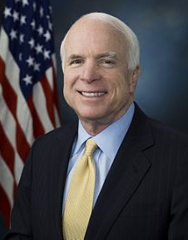The Life and Legacy of The ‘Maverick’: John McCain

John McCain official portrait, 2009 (Google Common License)
Republican Senator John Sidney McCain III passed away on August 25th, at approximately 4:28 pm MST in Cornville, Arizona. His family reported him deceased shortly after and said to have been with him in his final moments. Senator McCain had been battling an aggressive form of brain cancer, glioblastoma, for almost 14 months, and discontinued treatment the day before.
The Republican Senator from Arizona was born into a military family on August 29th, 1936, and was raised for combat. McCain served in the military, just as his father and grandfather before him, during the War in Vietnam as a naval aviator. McCain flew an A-4 Skyhawk fighter jet during his time in Vietnam, and in 1967, crashed his plane into the Hanoi forest, broke both arms and legs, and was captured and beaten. After 5 long years of negotiations and torture, McCain refused release until every other POW was returned to the United States at the conclusion of the war (USA Today).
Fast-forward a decade and a half, and John McCain took to the political stage by storm by winning the House Minority seat in Arizona and made a real presence in general elections, with little to no true competition in his way. Since the 21st century, McCain had run for president twice, one time in 2000 and lost the nominee to George W. Bush, and again in 2008 where he won the nomination but conceded to Barack Obama (USA Today).
McCain’s political success paved the way for establishment conservatives for a long time to come from his 30 year career in politics. He will be remembered for his maverick-like stubbornness to partisanism and staunch disputes with current president Trump. However, the question now is who will take his place in the Arizona senate seat. Arizona Governor Doug Ducey legally has to appoint someone in McCain’s place, but claims he will remain silent until after McCain’s burial (Vox).
All in all, McCain was a true ‘maverick’ during his incumbency as senator and set a precedent for bipartisanism at the top level in US government, which could be of more use in retrospect today. While many mourn in silence and sorrow, I believe that his life and legacy should be celebrated for its fruitful contribution to society and politics in modern America, to an extent in which not many bring to the table.
Sources:
